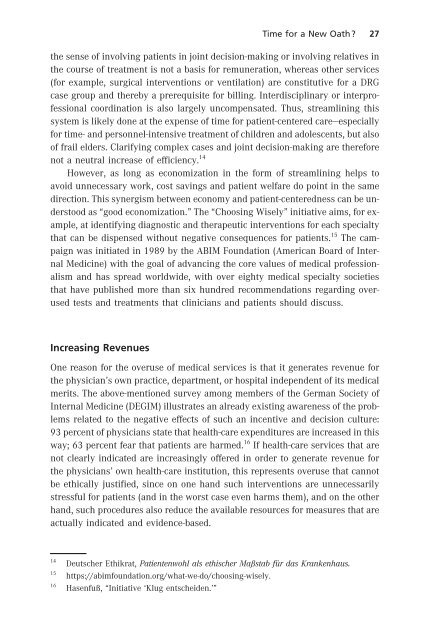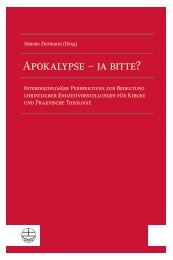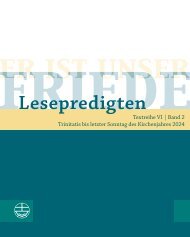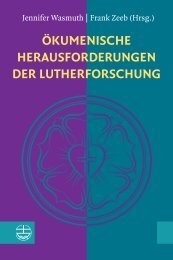Michael Welker | Eva Winkler | John Witte, Jr. | Stephen Pickard (Eds.): The Impact of Health Care (Leseprobe)
Pluralism has become the defining characteristic of many modern societies. Not only a plurality of individual and social claims and activities gain impacts on societal life. A creative pluralism of institutions and their norms profoundly shape our moral commitments and character – notably the family, the market, the media, and systems of law, religion, politics, research, education, health care, and defense. In the theoretical, empirical, and historical contributions to this volume, specialists on medicine, medical ethics, psychology, theology and health care discuss the many challenges that major transformations in their areas of expertise pose to the communication and orientation in late modern pluralistic societies. Contributors come from Germany, the USA and Australia.
Pluralism has become the defining characteristic of many modern societies. Not only a plurality of individual and social claims and activities gain impacts on societal life. A creative pluralism of institutions and their norms profoundly shape our moral commitments and character – notably the family, the market, the media, and systems of law, religion, politics, research, education, health care, and defense.
In the theoretical, empirical, and historical contributions to this volume, specialists on medicine, medical ethics, psychology, theology and health care discuss the many challenges that major transformations in their areas of expertise pose to the communication and orientation in late modern pluralistic societies. Contributors come from Germany, the USA and Australia.
Create successful ePaper yourself
Turn your PDF publications into a flip-book with our unique Google optimized e-Paper software.
Time for aNew Oath? 27<br />
the sense <strong>of</strong> involving patients in jointdecision-making or involvingrelatives in<br />
the course <strong>of</strong> treatment is not abasis for remuneration, whereas other services<br />
(for example, surgical interventions or ventilation) are constitutive for aDRG<br />
case group and thereby aprerequisite for billing. Interdisciplinary or interpr<strong>of</strong>essional<br />
coordination isalso largely uncompensated. Thus, streamlining this<br />
system is likely done at the expense <strong>of</strong> time for patient-centered care—especially<br />
for time- and personnel-intensive treatment <strong>of</strong> children and adolescents, but also<br />
<strong>of</strong> frail elders. Clarifying complex cases and joint decision-making are therefore<br />
not aneutral increase <strong>of</strong> efficiency. 14<br />
However, aslong as economization in the form <strong>of</strong> streamlining helps to<br />
avoid unnecessary work, cost savings and patient welfare dopoint in the same<br />
direction. This synergism between economy and patient-centeredness can be understood<br />
as “good economization.” <strong>The</strong> “Choosing Wisely” initiative aims, for example,<br />
at identifying diagnostic and therapeutic interventions for each specialty<br />
that can be dispensed without negative consequences for patients. 15 <strong>The</strong> campaign<br />
was initiated in 1989 by the ABIM Foundation (American Board <strong>of</strong> Internal<br />
Medicine) with the goal <strong>of</strong> advancing the core values <strong>of</strong> medical pr<strong>of</strong>essionalism<br />
and has spread worldwide, with over eighty medical specialty societies<br />
that have published more than six hundred recommendations regarding overused<br />
tests and treatments that clinicians and patients should discuss.<br />
Increasing Revenues<br />
One reason for the overuse <strong>of</strong> medical services is that it generates revenue for<br />
the physician’sown practice, department, or hospital independent <strong>of</strong> its medical<br />
merits. <strong>The</strong> above-mentioned survey among members <strong>of</strong> the German Society <strong>of</strong><br />
Internal Medicine (DEGIM) illustrates an already existing awareness <strong>of</strong> the problems<br />
related to the negative effects <strong>of</strong> such an incentive and decision culture:<br />
93 percent <strong>of</strong> physicians state that health-care expenditures are increased in this<br />
way; 63 percent fear that patients are harmed. 16 If health-care services that are<br />
not clearly indicated are increasingly <strong>of</strong>fered in order to generate revenue for<br />
the physicians’ own health-care institution, this represents overuse that cannot<br />
be ethically justified, since on one hand such interventions are unnecessarily<br />
stressful for patients (and in the worst case even harms them), and on the other<br />
hand, suchprocedures also reduce the available resources for measures that are<br />
actually indicated and evidence-based.<br />
14<br />
15<br />
16<br />
Deutscher Ethikrat, Patientenwohl als ethischer Maßstab fu rdas Krankenhaus.<br />
https://abimfoundation.org/what-we-do/choosing-wisely.<br />
Hasenfuß, “Initiative ‘Klug entscheiden.’”
















